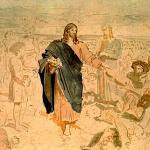That the pre-eminent Cause of every object of sensible perception is none of the objects of sensible perception.
WE say then- that the Cause of all, which is above all, is neither without being, nor without life—-nor without reason, nor without mind, nor is a body—-nor has shape—-nor form—-nor quality, or quantity, or bulk—-nor is in a place—-nor is seen—-nor has sensible contact—-nor perceives, nor is perceived, by the senses—-nor has disorder and confusion, as being vexed by earthly passions,—-nor is powerless, as being subject to casualties of sense,—-nor is in need of light;—-neither is It, nor has It, change, or decay, or division, or deprivation, or flux,—-or any other of the objects of sense.
After explaining his methodology, Dionysius put it to use, showing the way apophatic theology, and its denials about God, are to be engaged by those who would like to seek after the truth of God. He provided the means by which his reader can follow him in a theological ascent, abstracting away from our thoughts all the images and ideas which we have of God which are not proper to God, so that we no longer have them in our mind, distracting us from the truth which is to be found only in union with God himself.
In this fashion, what he wrote in the next two chapters can be read theologically, helping to counter any of our poor theological notions about God. Nonetheless, it can also be read as a meditational tool, where he gave us the means by which we can slowly clear our mind so that then properly direct it towards God. The two, for Dionysius, go together. Theology is not meant to be pure theory without application; its value lies in its ability to help transform us, making us ready for God. This is not to say it is purely pragmatic without interest in the truth; it must always be founded upon the truth as it is able to be established in conventional truth, else where we direct ourselves will not be towards God, but something other than God, hindering us from our goal. Positive theological statements, even apparent doctrinal statements, will have to have their outward shell removed, so that the truth behind such theological declarations can remain.
The ascent has to be done in proper order. Before Dionysius explained the problems of various intellectual, non-material or intelligible representations of God, he first wrote on the problems concerning notions of God founded upon images established by the realm of perception. That is what is to be found in this chapter. But even then, Dionysius had to find a starting point for his theological reflection. Following Proclus, and Platonic philosophy in general, Dionysius did this by calling God the Cause of all, the foundation by which and from which all things come to be, which is above all. That is, as Ficino explained, God is preeminent, above all things, without proportion infinitely greater than all which comes from him:
He adds that God is a cause in a preeminent way. For the rest of the causes have some proportion with their effects, because causes and effected are contained under the same universal principle of things. Thus the fiery sphere has some proportion with [all] hot effects, or rather Mars and Sun do, as the Platonists confirm. But the first cause has no proportion at all with any effect, as Plato demonstrates. Rather it creates absolutely and with absolute infinity, otherwise it would not be utterly simple and first.[1]
God, the Cause of all, can be said to be the first cause. He is simple and infinite, transcending all thought constructions, and yet, from his bounty, he grants a share of being to all existing things. What he is by nature they cannot be, but yet they can and do partake of him, finding themselves contained by him so that he is said to have them while not being possessed by them. His infinite transcendence allows for no proportional relationship with any created being, because their finite existence will equally be nullified by his transcendence. Nonetheless, we can discern analogical conventions which help point the way by which we can come to apprehend the truth about God, and these are what we use, slowly moving up the chain of being until we come to the end of that chain and find ourselves at its cause with God.
Dionysius, with great skill, showed us how apophaticism can grant us the means to approach God, making sure that we do not confuse apophatic denial with nihilism, by saying that God is neither without being, nor without life—-nor without reason, nor without mind. Here, we find a denial for God which actually affirms something positive about him, though of course, we will have to follow the lead carefully lest we misconstrue what we gain from this apophatic denial and turn God into a thing as a result. Dionysius first suggested that God is not without being; we must not think of this as meaning he is with being as if it is a predicate to God, making God like any other contingent entity. Rather, this was Dionysius’s attempt to point out the transcendence of God, to show that what is thought of by those without being, that is, those things which do not exist or have any reality to them, is not what we should mean if we deny being to God. God is not without that which being possesses, because he possesses and grants the reality of being itself, as He is the cause of being. In this fashion, we can say he is not without being because he is not without the reality which is implied by being, though we must not confuse him to possessing being either, lest, we turn him to something less than the Cause of all things, including being.
Likewise, when we think of something without life, we think of them as inanimate, something which exists as a pure object without subjectivity. When we think of something without reason or mind, we think of something irrational, incapable of engaging rational discourse, incapable of working with and discussing great ideas, indeed, incapable of knowing the truth and remembering the things which have happened. God, by being the cause of all things, certainly transcends what it means to be with being, with life, with reason, and with mind. Some translators and commentators, confused by what Dionysius meant, thought Dionysius was already denying these qualities to God, because God is without qualities, forgetting that Dionysius here was at the beginning of his ascent, and needing to find a starting point of his discussion which allows God to be great and which relies, in part, on kataphatic theology.[2] Dionysius, with skillful means, therefore wrote as he did, making sure we would not deny the truth of God himself, as the scholia attributed to Anastasius explained: “For Dionysius had to forewarn his reader through that, that he might not guess from the rest of the rejections that there is no divinity at all.”[3] Similarly, St. Albert the Great suggested that we can say God is with being, life, reason and mind, not because they are qualities predicated to them, but because “they proceed formally from him.” [4] In this fashion, Dionysius not only affirmed the divinity, making sure we do not end up denying it in a nihilistic fashion, in the means by which he did so, he also affirmed the creation of God, saying that by establishing them, he is not to be found without them, so that creation itself, and the qualities within it, or not nihilistically denied.
Therefore, God, the first cause, is to be understood as something superior to anything which we find in the realm of creation. When we engage apophatic denials, it is for the sake of his transcendence. We must be careful in how we engage such denials. We do not want to confuse those who listen to us to thinking we are denying God himself. What is misconstrued about God is what is to be denied. God is to be God, the transcendent source and foundation of all things. In this way, he is never without that which he has established, even if he is himself beyond them. We can say he is not without being, life, reason and mind because he has established them; they come from him and participates in him as their proper cause. He is not them, though we can describe him through them with proper analogical understanding, as we establish the truth of God in conventional form.
[Image=Woodcut for “Die Bibel in Bildern”, 1860. By Julius Schnorr von Carolsfeld [Public domain], via Wikimedia Commons]
[1] Marsilio Ficino, Mystical Theology in Marsilio Ficino: On Dionysius the Areopagite. Volume I: Mystical Theology and The Divine Names, Part I. trans. And ed. Michael J. B. Allen (Cambridge: Harvard University Press, 2015), 73.
[2] See, for example, Thomas Gallus “Exposicio” in Mystical Theology: The Glosses of Thomas Gallus and the Commentary of Robert Grosseteste on De Mystica Theologia. Trans. and ed. By James McEvoy (Parish: Peeters, 2003), 45.
[3] A Thirteenth-Century Textbook of Mystical Theology at the University of Paris. trans. L Michael Harrington (Paris: Peeters, 2004), 95.
[4] St. Albert the Great, “Commentary on Dionysius’ Mystical Theology” in Albert & Thomas, Selected Writings. Trans. Simon Tugwell, OP (New York: Paulist Press, 1988), 187














